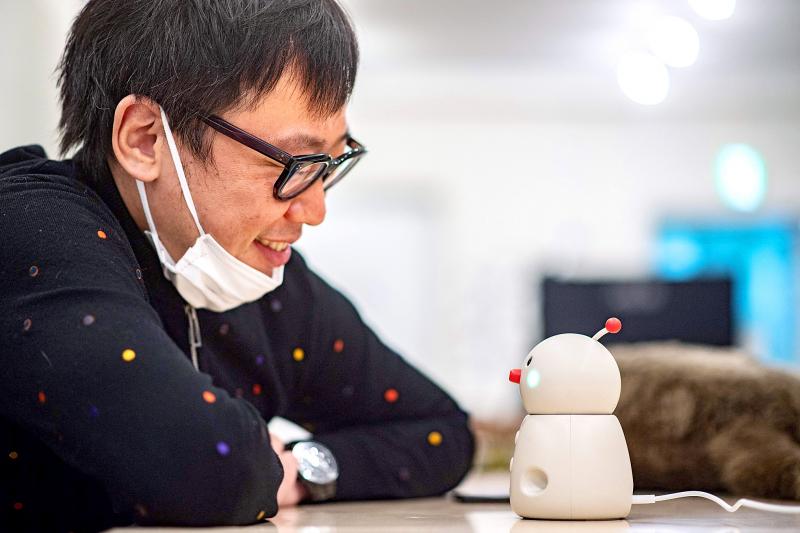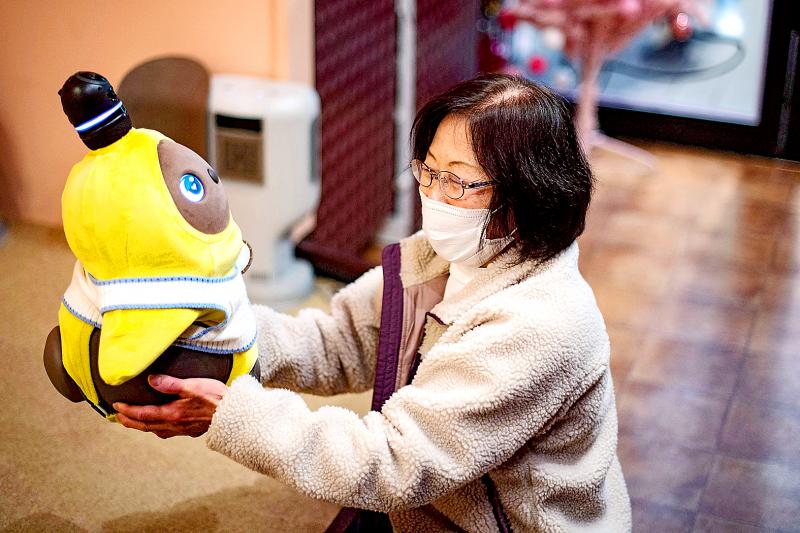Nami Hamaura said she feels less lonely working from home thanks to her singing companion Charlie, one of a new generation of cute and clever Japanese robots whose sales are booming in the COVID-19 pandemic.
Smart home assistants such as Amazon’s Alexa have found success worldwide, but tech firms in Japan are reporting huge demand for more humanlike alternatives, as people seek solace during COVID-19 isolation.
“I felt my circle became very small,” said 23-year-old Hamaura, a recent graduate who has worked almost entirely remotely since April last year.

Photo: AFP
With socializing limited, life in her first job at a Tokyo trading company was nothing like she had imagined.
So she adopted Charlie, a mug-sized robot with a round head, red nose and flashing bow tie, who converses with its owner in song.
Yamaha Corp, which makes Charlie, describes it as “more chatty than a pet, but less work than a lover.”

Photo: AFP
“He is there for me to chat with as someone other than family, or friends on social networks or a boss I needed to produce a report for,” Hamaura said.
She is a prelaunch test customer for Charlie, which Yamaha plans to release later this year.
“Charlie, tell me something interesting,” she asked while typing at her dining table.
“Well, well ... balloons burst when you spray lemon juice,” he said, cheerfully tilting his head to each side.
Sharp Corp said that sales of its small humanoid Robohon were up 30 percent in the three months to September last year from a year earlier.
“Not only families with children, but also seniors in their 60s and 70s” are snapping up Robohon, which talks, dances and is also a working phone, a Sharp spokesman said.
However, the adorable android — first released in 2016 and only available in Japan — does not come cheap, with regular models priced between US$820 and US$2,250.
Charlie and Robohon are part of a new wave of robot companions pioneered by firms such as Sony Corp with its robot dog Aibo, on sale since 1999, and SoftBank Group Corp’s friendly Pepper, which hit shelves in 2015.
“Many Japanese people accept the idea that every object has a soul,” said Shunsuke Aoki, chief executive officer of robot firm Yukai Engineering. “They want a robot to have a character, like a friend, family or a pet — not a mechanical function like a dishwasher.”
Yukai’s robots include Qoobo, a fluffy pillow with a mechanical tail that wiggles like a real pet.
The firm is soon to release its latest home assistant “Bocco emo,” which looks like a miniature snowman and allows families to leave and send voice messages through their phones.
Kaori Takahashi, 32, bought a Yukai robot-building kit for her six-year-old son to keep him occupied during the pandemic.
Robots feel normal in everyday life because they are in so many Japanese children’s films and cartoons, she said.
“I grew up watching anime shows The Astro Boy Essays and Doraemon, which both feature robots, and my children love them too,” she said.
Studies have shown that therapeutic robot pets designed in Japan, such as fluffy mechanical seals, can bring comfort to dementia patients.
Yet the makers of Lovot — a robot the size of a small toddler, with big round eyes and penguin-like wings that flutter up and down — think everyone can benefit from a bot that just wants to be loved.
It has more than 50 sensors and an internal heating system, making it warm to touch, which it reacts to with squeaks of joy.
Manufacturer Groove X said monthly sales shot up more than tenfold after COVID-19 hit Japan.
A single Lovot costs about US$2,800, plus fees for maintenance and software — but those without deep pockets can visit the “Lovot Cafe” near Tokyo instead.
One customer there, 64-year-old Yoshiko Nakagawa, called out to one of the robots fondly by name, as if to a grandson.
During Japan’s virus state of emergency, the capital became “stark and empty,” she said. “We need time to heal ourselves after this bleak period. If I had one of these babies at home, the heartwarming feeling would probably do the trick.”

Taiwan’s rapidly aging population is fueling a sharp increase in homes occupied solely by elderly people, a trend that is reshaping the nation’s housing market and social fabric, real-estate brokers said yesterday. About 850,000 residences were occupied by elderly people in the first quarter, including 655,000 that housed only one resident, the Ministry of the Interior said. The figures have nearly doubled from a decade earlier, Great Home Realty Co (大家房屋) said, as people aged 65 and older now make up 20.8 percent of the population. “The so-called silver tsunami represents more than just a demographic shift — it could fundamentally redefine the

The US government on Wednesday sanctioned more than two dozen companies in China, Turkey and the United Arab Emirates, including offshoots of a US chip firm, accusing the businesses of providing illicit support to Iran’s military or proxies. The US Department of Commerce included two subsidiaries of US-based chip distributor Arrow Electronics Inc (艾睿電子) on its so-called entity list published on the federal register for facilitating purchases by Iran’s proxies of US tech. Arrow spokesman John Hourigan said that the subsidiaries have been operating in full compliance with US export control regulations and his company is discussing with the US Bureau of

Businesses across the global semiconductor supply chain are bracing themselves for disruptions from an escalating trade war, after China imposed curbs on rare earth mineral exports and the US responded with additional tariffs and restrictions on software sales to the Asian nation. China’s restrictions, the most targeted move yet to limit supplies of rare earth materials, represent the first major attempt by Beijing to exercise long-arm jurisdiction over foreign companies to target the semiconductor industry, threatening to stall the chips powering the artificial intelligence (AI) boom. They prompted US President Donald Trump on Friday to announce that he would impose an additional

Pegatron Corp (和碩), a key assembler of Apple Inc’s iPhones, on Thursday reported a 12.3 percent year-on-year decline in revenue for last quarter to NT$257.86 billion (US$8.44 billion), but it expects revenue to improve in the second half on traditional holiday demand. The fourth quarter is usually the peak season for its communications products, a company official said on condition of anonymity. As Apple released its new iPhone 17 series early last month, sales in the communications segment rose sequentially last month, the official said. Shipments to Apple have been stable and in line with earlier expectations, they said. Pegatron shipped 2.4 million notebook